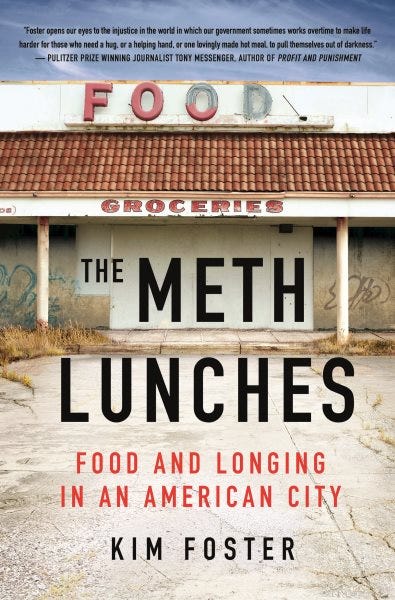What's Good?
No techno-optimist manifestoes here, good riddance
Happy Friday! What's good?
I already think about food as a conduit for connection—it’s a cliché now. “Food brings us together” and “Food connects us.” The messages are everywhere. A sea of perfectly constructed social media food images floods my feeds daily. It’s all beautiful, heavily curated, intentional, and privileged. The people eating are happy, smiling, and having a ball. It’s a monoculture of food happiness. I am a contributor to this culture. I like a good dish shot as much as anyone.
But food is also a conduit for disconnection, stress, family trauma, and workplace abuse. …In families, the table, the eating together, the passing of plates may hold discomfort, anxiety, and anger. It brings up things that can, in other environments, be let go. For others, the table holds scarcity, an annihilating reminder of their poverty. While others have food on their table, but no one sitting next to them to share it.
Food can be a weapon. Food can be a way to control. And punish. And abuse. And force people to conform. — Kim Foster, The Meth Lunches
I wanted to write a longer review for you this week of The Meth Lunches, a book about addiction, poverty, and food. But, quite frankly, I didn't give myself time to sit with my feelings about the former — to unwind my own experiences cleaning out the houses once inhabited by addicts, noting the ways in which the condiments were stockpiled, the garbage un-emptied, filled with boxes of Popeyes Chicken splurged upon but half-eaten — how appetites were both stirred and curbed by drugs and alcohol and cigarettes. All of this is so relevant for the project I’ve undertaken here at Second Breakfast, and still so hard for me to think through myself — let alone think through for you.

I will say this: The Meth Lunches is a beautiful, difficult book, and I highly recommend it. It's based on an essay Foster wrote in 2017 for the Desert Companion; the opening sentence: "There is a meth addict eating chicken yakitori on our back patio." It's an incredibly moving book about the politics and poetics of food and community. And it's a good reminder too that the dominant narratives about food — you know, the ones I track here in this Friday newsletter — never tell the whole story, mostly because they don't tell people's stories or even communities’ stories, but rather industries'.
e.g. This week's food news: "What Happens to Your Body When You Eat Cereal Every Day." "The new world's hottest pepper, Pepper X, is 3 times spicier than its predecessor." "Guy Fieri Is Opening a Restaurant in Manhattan Again," The Eater tell us — so at least we have another scorching Pete Wells review to look forward to, perhaps. "The Salmon on Your Plate Has a Troubling Cost. These Farms Offer Hope." "Self-Checkout Is a Failed Experiment." "How Lunchables Ended Up on School Lunch Trays." There are exceptions, of course, to the industry focused narratives. Like when Lyz Lenz writes about apple-picking and women's work.
In sports / technology news: Virginia Sole-Smith and Christine Yu chat: "We Have Only Recently Acknowledged That Female Athletes Need to Eat." See also: "The gold medal skier and the eating disorder that hasn’t gone away."
Elsewhere in the wellness hustle: RIP to Suzanne Somers. Some folks will remember her as a star of Three's Company. Others will remember her hawking the thigh master. Indeed, as The New York Times put it: "Long before influencers took over, the actress went from sitcom fame to cheerleader for supplements, exercise fads and sexual wellness, with great success." What was bullshit when Suzanne Somers did it is, in fact, still bullshit. "Is Your Body Out of Sync With a Man’s World? On TikTok, influencers promise you can beat burnout by planning your life around your menstrual cycle." "Wearables Track Parkinson’s Better Than Human Observation, Study Finds." Folks have been asked Anjali Praserton "What Do You Think About the WaPo Dietitian Influencer Article?" So she's gonna tell you. "Tech’s Favorite Body Scan Startup Is the Latest Hot Corporate Perk."
I regret to inform you that one of the biggest hustlers in the business came out this week with an essay that drew on Marinetti's Futurist Manifesto. As I've argued elsewhere here at Second Breakfast, you can readily connect fascism and wellness, eugenics and fitness — so let's be really honest about what it means when someone like Marc Andreessen openly embraces this violent, right-wing machismo that he calls "techno-optimism." Dave Karpf has a very good response, and you'll learn more from reading that than you will reading anything that Andreessen has ever written or done. (Like most entrepreneurs, he has never "done the reading" and you have to wonder if he cribbed from Marinetti purposefully or, more likely, just coincidentally, is also “nourished by fire, hatred, and speed.”) Another book recommendation, while I think of it: Blood in the Machine by Brian Merchant.
"Down with all kings but King Ludd." — Ada Lovelace's dad.





